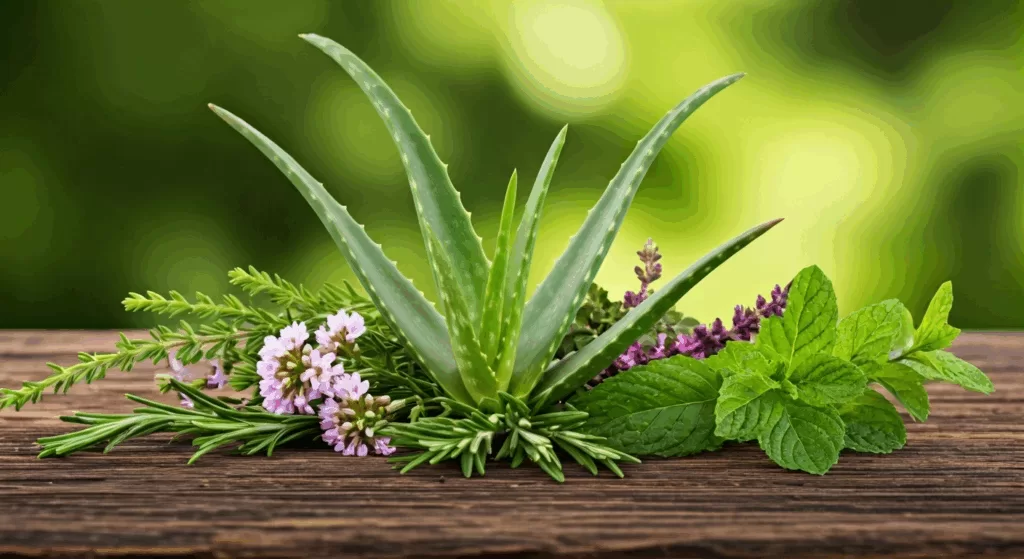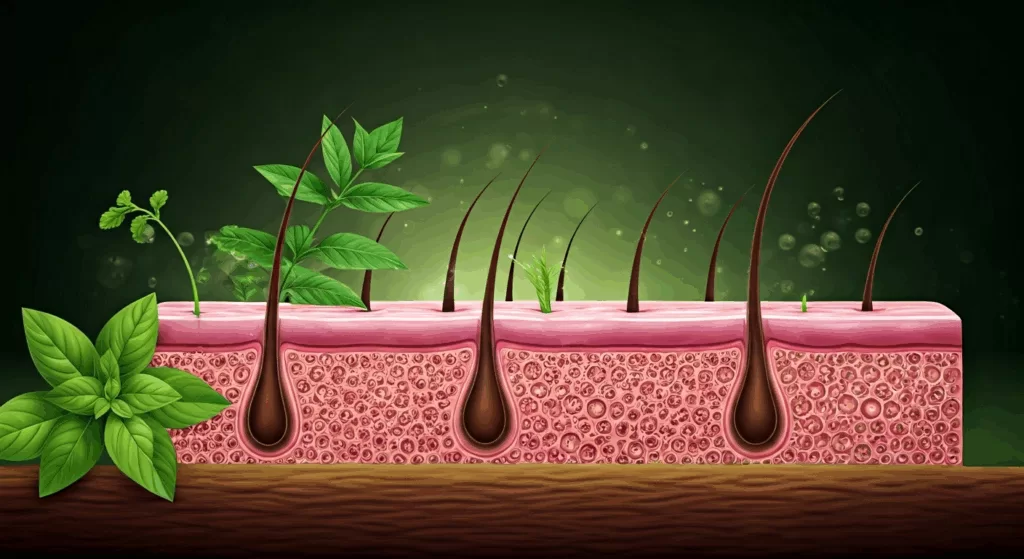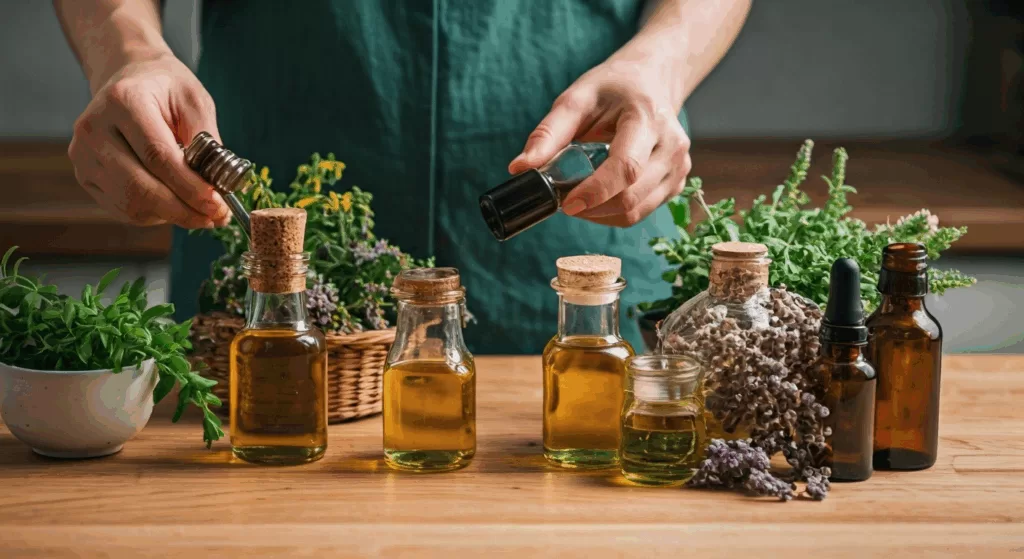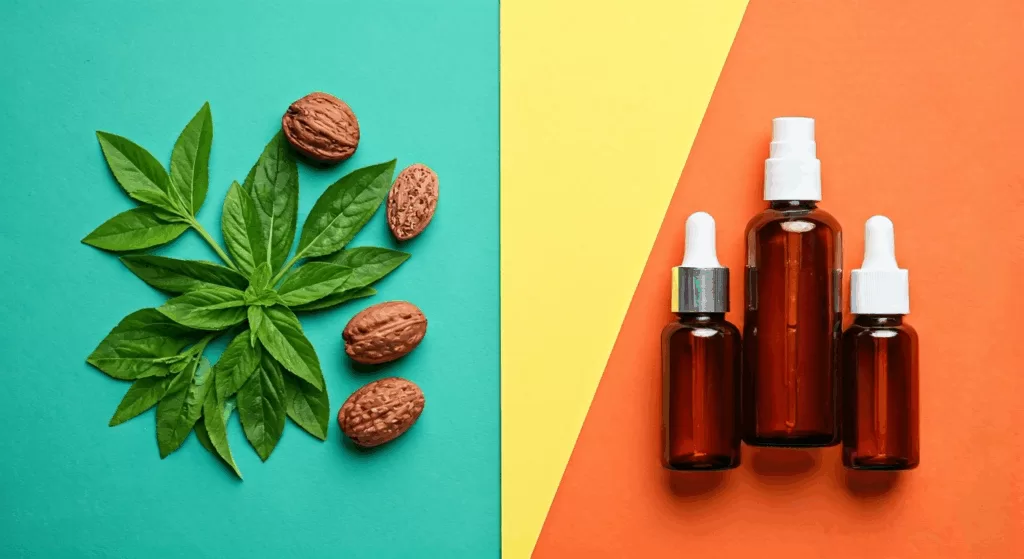Key Highlights
- Herbal remedies offer natural solutions to hair thinning, hair breakage, and hair loss prevention without severe side effects.
- Aloe vera, lavender oil, and rosemary oil are among the top herbs known for promoting blood circulation and strengthening hair follicles.
- Essential oils, like peppermint and lavender, support scalp health and encourage new hair growth by nourishing hair roots.
- Herbs such as ginseng, curry leaves, and hibiscus improve hair density, revitalizing weak strands.
- Practical techniques like homemade herbal mixtures and patch tests enable safe and effective application of natural solutions.
Table of Contents
Introduction
Hair thinning and loss are common issues for many people. But you do not need to use strong chemicals to help with hair regrowth. Using herbal remedies is a fresh way to help with hair growth. These natural solutions use the power of herbs and essential oils to help hair follicles. They also keep your scalp healthy and work on weak hair strands. You may get healthier hair because of these natural choices. There are also fewer side effects when you use them instead of regular treatments. Want to know more about how to get healthy hair? Read on to find out which herbs help the most for good and healthy hair growth.
Top 10 Herbs for Hair Regrowth Solutions

Herbal solutions have been used for a long time because they help boost hair health and wake up hair follicles. Aloe vera, rosemary oil, and neem are great if you deal with hair thinning or have trouble with a dry and itchy scalp. Hibiscus and curry leaves also have many nutrients. These can bring back shine and give more strength to weak hair.
If you want to fix many hair problems at once, try adding these good herbs to your hair care regimen. The natural power from these plants gives you a safe way to get better hair growth. You do not have to use any harsh chemicals when you use these.
1. Aloe Vera
Aloe vera is known to help with many hair problems. It calms skin that gets red or itchy on the scalp and keeps the right amount of moisture there. This is important for healthy hair growth. Aloe vera gel has many good vitamins and minerals to help make hair strands stronger. This helps stop damage and breakage.
The best way to use aloe vera for your hair is to take fresh aloe vera gel and put it straight on your scalp. Use your hands to spread it. Let the gel stay on for about 30 minutes. Then wash it out with a gentle shampoo. If you do this over time, you might see your hair get softer and much stronger.
Aloe vera also helps the scalp because it cuts down on dandruff and helps hair follicles stay in good shape. The way it keeps things hydrated helps you get fuller and healthier hair. Adding aloe vera to your hair care routine gives it a bit of calm and helps bring new life to your hair.
2. Rosemary Oil
Rosemary oil is well known for helping make hair thicker and for fighting hair thinning. This oil can help blood flow better in the scalp. That helps the hair roots get stronger. It also helps with dandruff and can slow down early greying.
To get the most out of rosemary oil, mix it with a carrier oil like coconut or olive oil. Massage this mix into your scalp. Let it sit for 30 minutes. After that, rinse it out with a mild shampoo. This way, your scalp can get the nutrients deeper in.
One thing that makes rosemary oil special is the way it can work as well as some chemical products. Studies have found that it works like minoxidil to wake up hair follicles for new growth. Rosemary oil is very good at making weak hair strands stronger. This makes it a must-have in any hair care regimen.
3. Peppermint Oil
Peppermint oil works well for helping good blood flow to hair roots. This makes hair follicles stronger and gives you thicker hair. When you use peppermint oil, it gives a cool feeling that helps open up hair roots. This lets deep nourishment in to make a long-lasting change.
To use peppermint oil, you should mix it with a carrier oil like coconut oil. Then, put it on the scalp. Rub your head gently for about 20 minutes. This helps the oil get deep into your skin. After that, wash it off with a soft herbal shampoo to get the best results.
The boost in blood circulation from peppermint oil gives a clear effect on the way hair looks and feels. It helps with new hair growth, too. Peppermint oil also calms the scalp and helps with irritation. By adding peppermint oil to your hair care, you take a smart step to get stronger, healthier hair roots and see more new hair growth.
4. Lavender Oil
Lavender oil helps keep the natural oils on your scalp at the right level. This creates a good space for steady hair growth. The oil has things in it that help calm and soothe an irritated scalp, and it is good for your overall hair health.
To get the most out of lavender oil, mix it with some coconut oil. Use this mix and do a gentle scalp massage. Let it stay on your scalp for 30 minutes. After that, wash it out with a shampoo made for people with sensitive scalps. If you do this often, you can make your scalp better and your hair quality may also get better.
Why does lavender oil stand out? It has a calming smell. That not only makes your hair soft, but it can also help lower stress, which can affect your hair health in the long run. If you use lavender oil in your scalp massage, you get both these good things. It can help your hair roots be balanced and feel nourished.
5. Ginseng
Ginseng is a well-known herb often used in traditional Chinese medicine. People like to use it because it helps with hair growth by improving blood circulation. This herb makes the dermal papilla cells in your scalp stronger. This work helps hair follicles stay healthy.
You can use ginseng in more than one way. It can be taken as a supplement, or you can put it directly on your scalp. What you choose depends on what you need. Many people say ginseng extract is good if you have hair loss for a long time. Still, it is a good idea to talk to a doctor before you take it by mouth.
What makes this herb stand out is its power to give scalp cells more energy, and it helps keep important nutrients in the hair. This makes it a smart choice for hair regrowth. If you use ginseng often in your hair care, you may see new growth and less hair fall. Try using it to see if you get smoother and thicker hair.
6. Hibiscus
Hibiscus is well known for helping with hair problems because it has amino acids and fatty acids. These natural ingredients work to boost the activity of your hair roots. This makes the hair less likely to break and helps it look more shiny and healthy.
If you crush hibiscus flowers and mix them with coconut oil, you get a strong hair mask. Put this hair mask on your scalp, keep it there for about 45 minutes, and then rinse it out. Adding hibiscus to your hair care routine is a good way to freshen up your tired hair strands.
This plant can make your hair roots stronger and help support scalp health, so it is a good choice for people who want healthy hair. Using hibiscus often in your routine is a simple way to help your hair stay strong, shiny, and full of life.
7. Neem
Neem’s antibacterial powers help keep the scalp clean and healthy. This is important because it can stop problems like dandruff that may slow down hair growth. At the same time, neem helps make your hair follicles stronger and helps lessen hair fall.
You can use neem as a rinse. Just boil its leaves in water. Let the water cool down, then use it to rinse your hair right after using shampoo. This can give you a cleaner scalp and stronger roots. Your hair will be healthier and ready to grow.
If you have tough scalp issues, neem works well to guard against bacteria and other bugs that can cause problems. It can give your hair a smoother feel. It also helps renew your hair, so you get better hair density and strength. Over time, you will notice good changes in your scalp’s health.
8. Bhringraj
Bhringraj is often called the “king of herbs.” It is great for new hair growth. The herb helps the scalp and can make hair look thicker. That means your hair strands can look and feel stronger.
To use Bhringraj, you can pick oil or make a paste with the powder and water for a hair mask. Massage the oil right onto your scalp or put the paste right on. Over time, you will see results. Bhringraj is known to work well by working at the hair follicles. This helps with steady hair growth.
This herb is a natural way to cut down hair shedding and keep the scalp in good shape. That is why people trust it for their hair. If you add it to your routine, your scalp will become better for new hair growth and recovery.
9. Fenugreek Seeds
Fenugreek seeds are filled with protein and vitamin C. Both are good for hair. This herb helps with a lot of hair disorders. It can help rebuild hair follicles. It can lower dandruff. Fenugreek seeds also help stop too much hair from falling out.
To use fenugreek seeds, soak them in water overnight. After that, grind them into a paste. Put this paste on your scalp and hair. Leave it for 30 minutes. Rinse your hair well after. This at-home treatment brings back shine and makes hair look fuller.
Fenugreek seeds bring many good things for your hair. They fight against thinning strands. They help clean and freshen the scalp as well. If your hair is dull, this nutrient-rich herb can bring life back to it. By using fenugreek seeds on a regular basis, you may see real results.
10. Curry Leaves
Curry leaves give hair roots the help they need by bringing in important nutrients like vitamin D and beta carotene. This can help stop common problems like hair breakage. Curry leaves can also slow down grey hair from coming too soon by making weak strands stronger.
When you boil curry leaves in coconut oil, you make a strong mix for your scalp. Put this mix onto your scalp, massage it in, and leave it for about 30 minutes. After that, wash it out with a good herbal shampoo.
The way this herb helps bring in needed nutrients for your hair is really special. If you add curry leaves to your routine, you can get stronger hair and protect your hair roots too.
Understanding Herbal Remedies and Hair Growth

Natural remedies can help people who want to take care of their hair follicles and make their scalp healthy again. Some scientific studies say that herbs, like lavender oil and rosemary, can wake up growth factors to help you get thicker and better hair.
These herbs also go after the main problems of thinning hair. They help with things like inflammation and vitamin d deficiency. These methods can work well, but we still need additional studies to be sure about all their good effects. Now, let’s look at how some herbs and oils can feed your scalp and roots in a natural way.
How Herbs Stimulate Hair Follicles
Various herbs have been used for a long time to help hair follicles and support hair growth. Ingredients like saw palmetto and ginseng work on androgen receptors. This can help reduce hair thinning that comes from hormone changes. Essential oils, like rosemary and peppermint, can make blood circulation better on the scalp. This makes it easier for nutrients to reach hair roots. Herbal extracts such as green tea and urtica dioica give antioxidants and growth factors. These help make hair strands thicker and can improve hair density and hair health.
The Role of Natural Oils in Nourishing Hair Roots
Natural oils are important for giving hair roots what they need. They also help make hair strands stronger and healthier. Oils like coconut oil and jojoba oil go deep into the hair to give the needed fatty acids. These are good for hair follicles and help with healthy hair growth. These natural ingredients help blood circulation to the scalp. That brings more nutrients to the area.
Using oils such as rosemary and peppermint in your hair care regimen can help with new growth, stop hair thinning, and make your scalp feel calm and balanced. This leads to healthy hair and better hair roots, making all hair strands better over time.
Practical Tips for Using Herbal Remedies

Choosing the best herbal remedy starts with knowing your hair needs. You should always do a patch test first. This helps see if you have any bad reaction to herbal extracts like saw palmetto or rosemary oil. When you add essential oils to carrier oils, such as coconut or olive oil, it can help your scalp take in the oils better.
These oils also help with blood circulation to hair follicles, which is good for hair growth. Using these mixtures for scalp massages often gets the dermal papilla cells working. This can help make your hair grow better. If you want to see real changes in hair density and hair health, be sure to use these treatments on a regular basis.
Preparing Homemade Herbal Mixtures for Hair
Making your own herbal blends at home brings the power of natural ingredients straight to your scalp. When you use essential oils like rosemary and peppermint with safe carrier oils like coconut or jojoba, you can help boost blood circulation to the hair follicles. This will give them the food they need to help support hair growth and keep hair healthy. Putting herbs like urtica dioica (nettle) or saw palmetto in these blends may also help with hair growth and add to the thickness of your hair.
To make a good hair mask, you can mix fresh aloe vera gel with green tea. This will help make your hair strands stronger and keep them from thinning. Before trying any new mixture, it is a good idea to do a patch test to see if the mix is okay for your skin.
Best Practices for Applying Herbal Solutions
Adding herbal solutions to your hair care routine needs careful steps. Start by making sure the scalp is clean. This helps the natural ingredients work better for your hair. To stay safe, mix strong herbal extracts with a carrier oil like coconut or jojoba oil. This helps your hair and scalp in a good way. When you do a gentle head massage, it can boost blood circulation. This is good for hair follicles and can make them more healthy.
Always do a patch test before you use new herbal remedies to check for any bad reaction. To have better and stronger hair, stick to your hair care regimen. Doing this every day can help you avoid hair thinning and breakage over time.
Comparing Herbal and Conventional Hair Regrowth Treatments

Herbal remedies usually give a softer way to care for hair. They are full of natural ingredients that can help with blood circulation and feed hair follicles. These remedies often do not bring the same harsh side effects you can get from some chemical products. Chemical treatments may make changes fast, but they can cause skin problems or other side effects. Some people can get more problems after a long time, mostly if they have issues like androgenetic alopecia or thyroid disease.
In the end, it is up to you to choose. What you want, your health needs, and how you wish the results to be, all play a part in making that choice.
What finally worked for your hair growth?
After trying various remedies, I found that a combination of rosemary oil and biotin supplements significantly boosted my hair regrowth. Incorporating these herbal treatments into my routine, alongside a balanced diet, yielded remarkable results. Consistency was key, leading to healthier and thicker hair over time.
Effectiveness of Herbal Solutions vs. Chemical Products
Herbal solutions for hair regrowth give you a natural choice if you do not want to use chemical products. They often be better for your hair because there are fewer side effects. Essential oils, such as rosemary and peppermint, along with plant extracts like saw palmetto and ginseng, can help improve blood flow to your scalp.
This can help new growth start and can be useful for problems like androgenetic alopecia and alopecia areata. Chemical treatments might give faster results at times, but they can also bring on irritation and cause hair breakage. Herbal remedies are mostly good because they use natural ingredients and they care for hair health in a much gentler way.
Side Effects and Safety Considerations
Natural ingredients can help herbal treatments work better, but some people might get side effects. It is good to do a patch test when you use new herbal products like rosemary oil or pumpkin seed oil. This helps lower the risk of skin irritation or allergic reactions. Also, some herbs like saw palmetto can react with some medicines, especially the ones for prostate problems. If you have any health issues or take medicine for things like blood circulation or thyroid, you should talk with your doctor before you start any herbal plan.
Conclusion
Adding herbal remedies to your hair care routine can help you a lot, especially if you deal with hair thinning or hair loss. When you use natural ingredients like essential oils and herbal extracts, you can take care of your hair roots. This will help with healthy hair growth and make your hair thicker. It is good to keep up this routine and also watch out for any side effects that might come up. Focusing on healthy hair and using natural ways is a great plan.
Using the power of nature is not only good for hair thickness but also helps your overall hair health. In the end, taking care of your hair in this way can really make a difference for you.
Frequently Asked Questions
Can herbal remedies work as fast as over-the-counter treatments?
Herbal remedies can work well, but they usually take more time to show clear changes when you compare them to regular over-the-counter treatments. People may not see the same results because everyone is different. It is important to be patient and to use these herbal solutions in a steady way. This will help you get the outcome you want.
Are there any age restrictions for using herbal hair regrowth solutions?
Herbal hair regrowth solutions are safe for most people and for people of all ages. Still, children and women who are pregnant or breastfeeding should talk to a doctor before using them. Everyone is different, so the way your skin reacts to these products can be different too. It is a good idea to do a patch test no matter your age.
How often should I apply herbal remedies to see results?
For the best results, use herbal remedies two to three times a week. It is important to keep up with this routine. This will help to get the hair follicles working and support hair growth. Watch how your hair reacts to the treatments. Change how often you use them if you see any signs of irritation but want to get the most out of the herbal treatments.
Can I use multiple herbal treatments at the same time?
Yes, you can use more than one herbal treatment at the same time. It is good to pick herbs that work well together. Be sure that they do not have effects that go against each other. You should also watch your scalp for any bad reactions. For the best results, it is smart to talk to a professional before you mix treatments.

